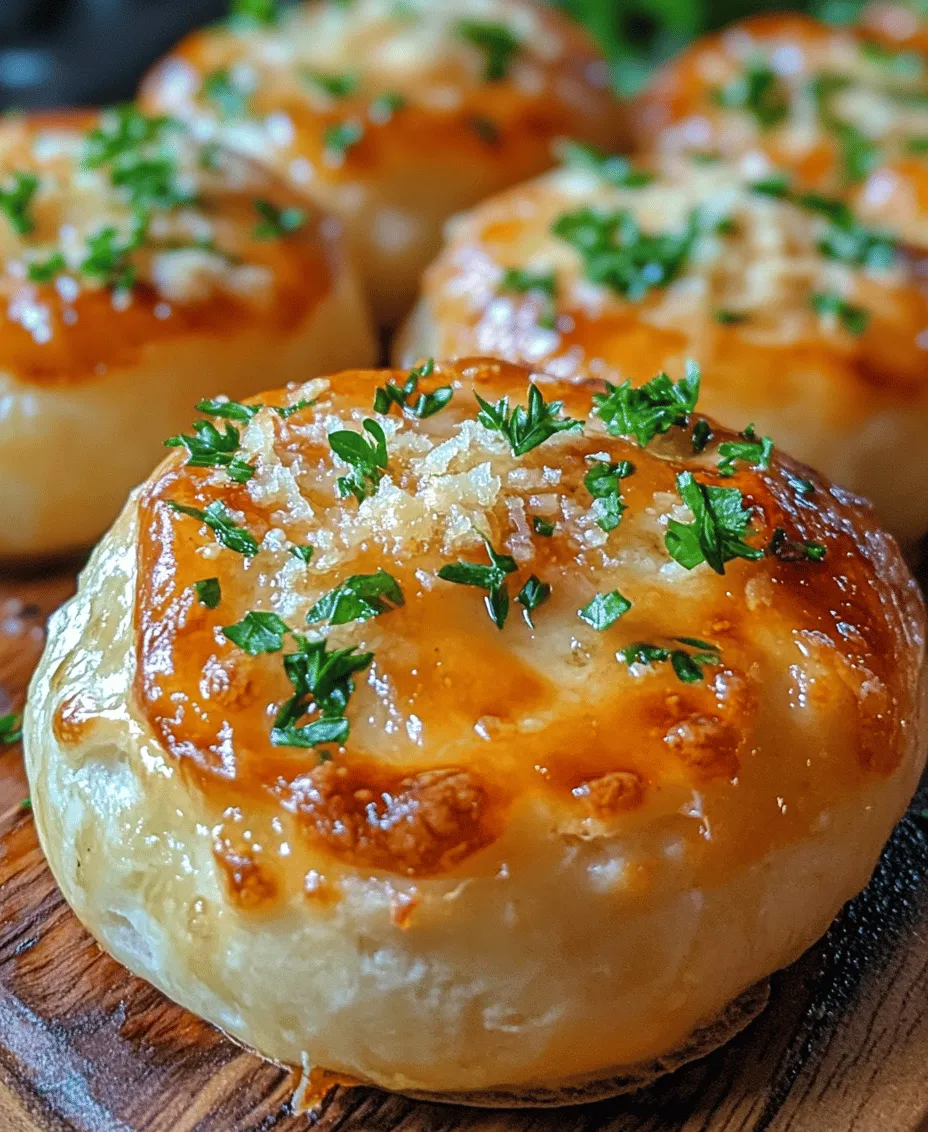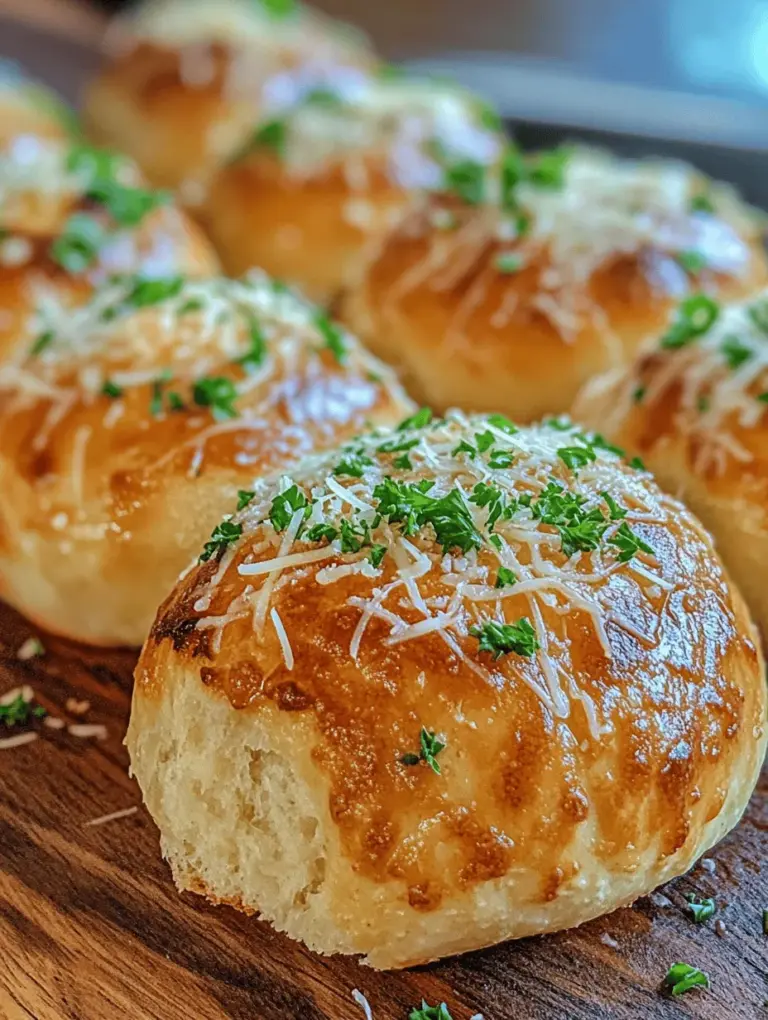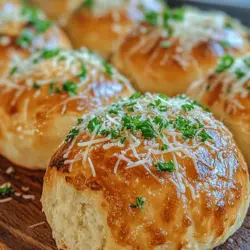Introduction
There’s something undeniably comforting about the smell of freshly baked bread wafting through your home. Homemade dinner rolls can transform a simple meal into a memorable occasion, providing warmth and satisfaction at the dining table. Among the countless variations of dinner rolls, garlic Parmesan dinner rolls stand out with their rich flavor and soft, pillowy texture. The combination of garlic and Parmesan creates a mouthwatering experience that elevates any dish, making it a favorite among families and guests alike.
In today’s fast-paced world, the demand for quick and easy recipes has grown tremendously. Whether you’re a busy parent trying to whip up a weeknight dinner or a host preparing for a gathering, having a recipe that can be put together swiftly is invaluable. These Quick & Tasty Garlic Parmesan Dinner Rolls not only save time but also promise a delightful culinary experience that doesn’t compromise on taste. In this article, you’ll learn everything from the alluring flavor profile of these rolls to the specific steps required to achieve the perfect batch.
The Allure of Garlic Parmesan Dinner Rolls
Garlic Parmesan dinner rolls are a delicious blend of savory and cheesy, with a hint of richness that makes each bite a pleasure. The aroma of garlic mingling with the nutty, salty notes of Parmesan cheese is simply irresistible. When baked to golden perfection, these rolls boast a soft, airy interior that contrasts beautifully with the slight crispiness of the crust. Each roll is a bite-sized delight that can complement a variety of meals—from hearty soups and salads to main dishes like roasted chicken or pasta.
The versatility of dinner rolls makes them suitable for numerous occasions. Imagine serving them at Sunday family dinners, holiday feasts, or casual get-togethers with friends. They can be enjoyed warm from the oven, slathered with butter, or used to mop up sauces and gravies. Whether you’re celebrating a special occasion or simply enjoying a cozy night in, garlic Parmesan dinner rolls are the perfect addition to any meal.
Understanding the Ingredients
To create these delectable rolls, it’s essential to understand the key ingredients that contribute to both flavor and texture. Here’s a closer look at what you’ll need:
Warm Water
Warm water is crucial in activating the yeast, which is the backbone of any bread recipe. The ideal temperature for warm water is around 105°F to 110°F (40°C to 43°C). Water that is too hot can kill the yeast, while water that is too cold won’t activate it effectively.
Active Dry Yeast
Active dry yeast is a leavening agent that plays a vital role in helping the dough rise. It consists of live yeast cells that are dehydrated. When you add warm water and sugar, the yeast awakens, feeding on the sugar and producing carbon dioxide gas, which causes the dough to rise. This process creates the light and fluffy texture that we associate with fresh rolls.
Sugar
Sugar is more than just a sweetener in this recipe; it acts as food for the yeast. By providing the yeast with sugar, you help it grow and multiply, resulting in a better rise and a more tender roll. A small amount of sugar also enhances the overall flavor of the rolls.
All-Purpose Flour
All-purpose flour is the standard choice for most bread recipes, including dinner rolls. It has a moderate protein content, which helps develop gluten as you knead the dough. This gluten formation is what gives the rolls their structure and chewiness. If you’re looking for a simple yet effective flour, all-purpose is the way to go.
Salt
Salt is essential for flavor, but it also plays a critical role in controlling yeast activity. It strengthens the gluten structure and helps regulate the fermentation process, ensuring that the rolls rise properly without over-expanding.
Unsalted Butter
Using unsalted butter allows for better control over the overall salt content in the recipe. Butter adds richness and flavor to the rolls, contributing to their tender crumb. Ensure that your butter is at room temperature for easy incorporation into the dough.
Garlic Powder
While fresh garlic has its merits, garlic powder offers convenience and ease of use in this recipe. It distributes evenly throughout the dough, providing consistent flavor in every bite. However, if you prefer the robust taste of fresh garlic, feel free to substitute it accordingly.
Parmesan Cheese
Parmesan cheese is the star ingredient in these rolls, adding a savory, nutty flavor that complements the garlic beautifully. It also contributes to the texture, creating a slightly chewy bite that pairs well with the soft dough.
Fresh Parsley
Fresh parsley not only adds a pop of color to the rolls but also brings a hint of freshness to the overall flavor. Chopped finely, it can be mixed into the dough or sprinkled on top before baking for an appealing presentation.
Egg Wash
An egg wash, made from beaten eggs and a splash of water or milk, is the secret to achieving a golden, glossy crust on your dinner rolls. This simple step elevates the appearance of the rolls, making them look as delicious as they taste.
Step-by-Step Instructions for Perfect Rolls
Now that you’re familiar with the ingredients, let’s delve into the step-by-step instructions to make your garlic Parmesan dinner rolls a reality.
Activating the Yeast: The Science Behind It
1. Combine Warm Water, Sugar, and Yeast: In a small bowl, mix together the warm water and sugar. Sprinkle the active dry yeast on top and allow the mixture to sit for about 5 to 10 minutes. You’ll know the yeast is active when it becomes frothy and bubbly.
2. Check for Activity: If the mixture doesn’t foam, it may indicate that your yeast is old or that the water temperature was incorrect. In this case, start over with fresh yeast and properly warmed water.
Mixing the Ingredients: Techniques for a Smooth Batter
3. Prepare the Dough: In a large mixing bowl, combine the all-purpose flour and salt. Once the yeast mixture is frothy, pour it into the flour mixture along with the softened unsalted butter.
4. Stir to Combine: Use a wooden spoon or spatula to mix the ingredients until they form a rough dough. You may need to adjust the amount of flour slightly depending on the humidity and the absorbency of your flour. The dough should be slightly sticky but manageable.
Kneading the Dough: Importance of Kneading and How to Do It Correctly
5. Knead the Dough: Transfer the dough onto a lightly floured surface. Knead the dough for about 8 to 10 minutes, or until it becomes smooth and elastic. You can tell the dough is ready when it springs back when gently pressed with your finger.
6. Form a Ball: Shape the kneaded dough into a ball and place it in a lightly greased bowl. Cover it with a clean kitchen towel or plastic wrap, allowing it to rise in a warm place until it doubles in size, which usually takes about 1 hour.
As the dough rises, it develops flavor and texture. This is a crucial step that allows the yeast to work its magic, creating the light and fluffy rolls you crave. Stay tuned for the next section, where we will continue with the shaping, second rise, and baking of these delicious garlic Parmesan dinner rolls!


